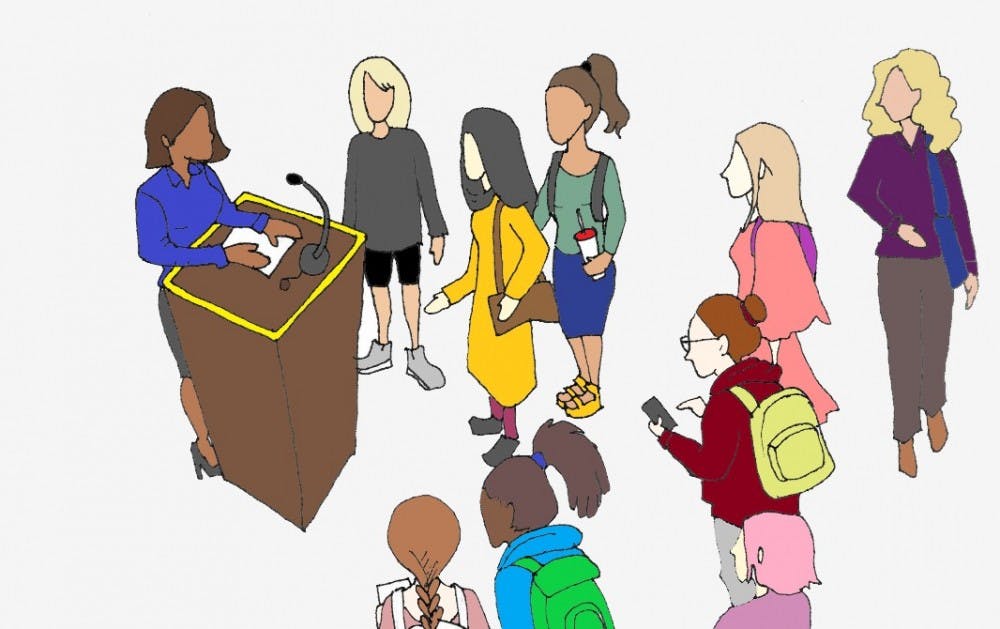In today's society, college women tend to look to female celebrities and social media influencers for inspiration on how to be successful in life.
While many of these women have incredible accomplishments and have surpassed great adversity, college women may overlook women in political power.
Now more than ever, female college students should look to those women to find inspiration and strength.
Miki Caul Kittilson, a professor in the School of Politics and Global Studies, conducts research funded by the National Science Foundation on women in high courts around the world. Kittilson believes it's important for female college-aged students to look up to women in political positions.
“It’s important to have women in positions like on the Supreme Court. One, there’s that role model effect," Kittilson said. "We can sort of watch careers and have a mentor and have a role model for the path that somebody might follow. At ASU right now, there’s probably a lot of women who could end up being a Supreme Court justice someday."
According to data from the ASU Sandra Day O’Connor College of Law, 48 percent of incoming first-year law students in Fall 2018 were women, and 37 percent of graduates from the School of Politics and Global Studies were women in the class of 2017, research shows.
"Sandra Day O’Connor really shattered those stereotypes and shattered the glass ceiling in the United States, and then a lot of other countries around the world followed suit," said Kittilson.
"That’s important to have a symbol that shows that whether it’s the Supreme Court or it’s a corporate board or it's Congress that it’s a place where women should be or it’s a place that’s acceptable for women to be."
Especially in federal positions, politics is male dominated.
According to 2017 data by Rutgers Eagleton Institute of Politics, men take up 351 out of the 435 seats in the House of Representatives. Additionally, out of the 100 seats in the Senate men take up 79.
The future of the generations to come is in the hands of college women. Nowadays, social change is more prevalent in the age group of college students, and many women in politics took their positions in order to ignite change.
Carol Moseley Braun ran for Senate in 1992, the Year of the Woman, along with four other women. Her election made her the first African American woman to win election to the U.S. Senate. A year later, Ruth Bader Ginsburg became the second woman appointed to the Supreme Court.
For the 2018 election, there is a historical number of women running for Congress. In September, CNN reported that "there are 234 women running for the House and 22 for the Senate."
Rather than taking the back seat, these women have pushed boundaries and shattered the glass ceiling.
Women are capable of instigating great change in society. From women's suffrage to the first women's movement to the modern day #MeToo movement, women have utilized politics to encourage change.
While women in different career fields have the power to bring light to the public about social and civil issues, women in politics are able to influence our government to make these changes. These women did not get discouraged and instead believed that they deserved a place in politics. They refused to settle and many refused the strict gender expectations that they were faced with.
These are the lessons college women should take to heart.
Rather than picking a major and thinking, ‘Well, I just want a job in this specific field,’ women should strive to hold high positions and seek political positions as well.
Reach the columnist at psaso@asu.edu and follow @paytonsaso on Twitter.
Editor’s note: The opinions presented in this column are the authors’ and do not imply any endorsement from The State Press or its editors.
Want to join the conversation? Send an email to opiniondesk.statepress@gmail.com. Keep letters under 500 words and be sure to include your university affiliation. Anonymity will not be granted.
Like The State Press on Facebook and follow @statepress on Twitter.




